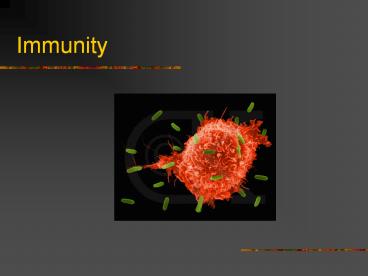Immunity - PowerPoint PPT Presentation
1 / 22
Title:
Immunity
Description:
Immunity Defenses Against Disease Immunity The ability of the body to resist disease. First studied by Edward Jenner in 1776. He found that he could use fluid from a ... – PowerPoint PPT presentation
Number of Views:62
Avg rating:3.0/5.0
Title: Immunity
1
Immunity
2
Defenses Against Disease
Lymph nodes makes lymphocytes.
White blood cells engulf microorganisms.
Cilia in respiratory tract sweep away debris.
Spleen filters out bacteria.
Stomach acid kills bacteria.
Skin acts as a barrier.
3
Immunity
- The ability of the body to resist disease.
- First studied by Edward Jenner in 1776.
- He found that he could use fluid from a cowpox
sore to vaccinate against smallpox (often fatal).
4
How Immunity Works
- The body is able to tell the difference between
self (its own cells and molecules) and
nonself (foreign cells and molecules).
5
How Immunity Works
- The reaction of the body to nonself cells is
called the immune response. - This involves destroying or neutralizing foreign
cells or molecules with white blood cells and
lymphatic tissue.
6
The Immune Response
- Antigens cause the immune response to happen.
- Most antigens are proteins, but some are
carbohydrates and nucleic acids. - Most microorganisms and toxins contain antigens.
7
The Immune Response
- Recognition and destruction of foreign antigens
is the job of the lymphocytes. - Lymphocytes are made in the bone marrow of the
embryo and are stored in lymphoid tissue.
8
Two Types of Lymphocytes (B T)
- Each lymphocyte has receptors for only one
antigen. - When the receptors recognize the antigen, the
lymphocytes become activated.
9
Activation of B Lymphocytes (BLs)
- When BLs are activated, they enlarge and divide
repeatedly to form two different cell types - 1. Plasma Cells
- 2. Memory Cells
10
1. Plasma Cells
- Plasma cells secrete antibodies, which are
proteins that react specifically with antigens
and inactivate them. - Antibodies have active sites that fit a
compatible site on a certain antigen.
11
Antigen-Antibody Reactions
- There are many different types of antibodies and
they inactivate antigens in five different ways.
antigens
antibodies
12
Antigen-Antibody Reactions
- 1. Agglutination Antigens are clumped together
and thus inactivated. - 2. Precipitation Antibodies form a complex with
the antigens, and the complex settles out.
13
Antigen-Antibody Reactions
- 3. Neutralization Antibodies combine with
antigens, inactivating the toxic site of the
antigen molecule.
14
Antigen-Antibody Reactions
- 4. Lysis Antibodies cause the cell membranes of
the antigenic microorganisms to burst.
15
Antigen-Antibody Reactions
- 5. Complement System The complement system is a
group of enzymes in the plasma. The
antigen-antibody complex activates these
enzymes, which attack the antigenic material.
16
2. Memory Cells
- The memory cells stay in the lymphoid tissue.
- If the same antigen enters the body, the memory
cells will immediately produce antibodies against
it.
17
Activation of T Lymphocytes (TLs)
- When TLs contact an antigen, they divide rapidly
and make more TLS.Some stay in the lymphoid
tissue as memory cells. - Other TLs pass into the circulatory system and
body tissues, where they combine with the
antigens and destroy them.
18
How Lymphocytes Make Antibodies
- Click here for animation.
19
Types of Immunity
- Three main types of immunity
- 1. Inborn Immunity
- 2. Acquired Immunity
- 3. Passive Immunity
20
1. Inborn Immunity
- Does not involve antibodies.
- Present in all humans from birth.
- Prevents humans from becoming infected with
certain types of bacteria and viruses. - Ex. Feline leukemia affects cats not humans.
21
2. Acquired Immunity
- Two ways to get it
- 1. Contracting a disease-Ex. Chicken pox. Memory
cells will,stay in the body and produce
antibodies. - 2. Vaccination-Vaccine serves to stimulate the
production of specific antibodies to certain
antigens.
22
3. Passive Immunity
- Does not last long (about one month).
- Body destroys the borrowed antibodies.
- Fast acting.
- Found in babies who get antibodies via mothers
milk. - Helps protect child for a few months.































